Health
Bryce Young Speaks Out on the Stigma That Comes With Mental Health Struggles as an Athlete
Bryce Young has been on a bumpy ride with the Carolina Panthers since being drafted, and it even took a toll on him last season. Unlike many others, the former number one overall pick has decided to speak openly about his mental health struggles. Prompting a conversation that not many fans, players, or coaches want […]


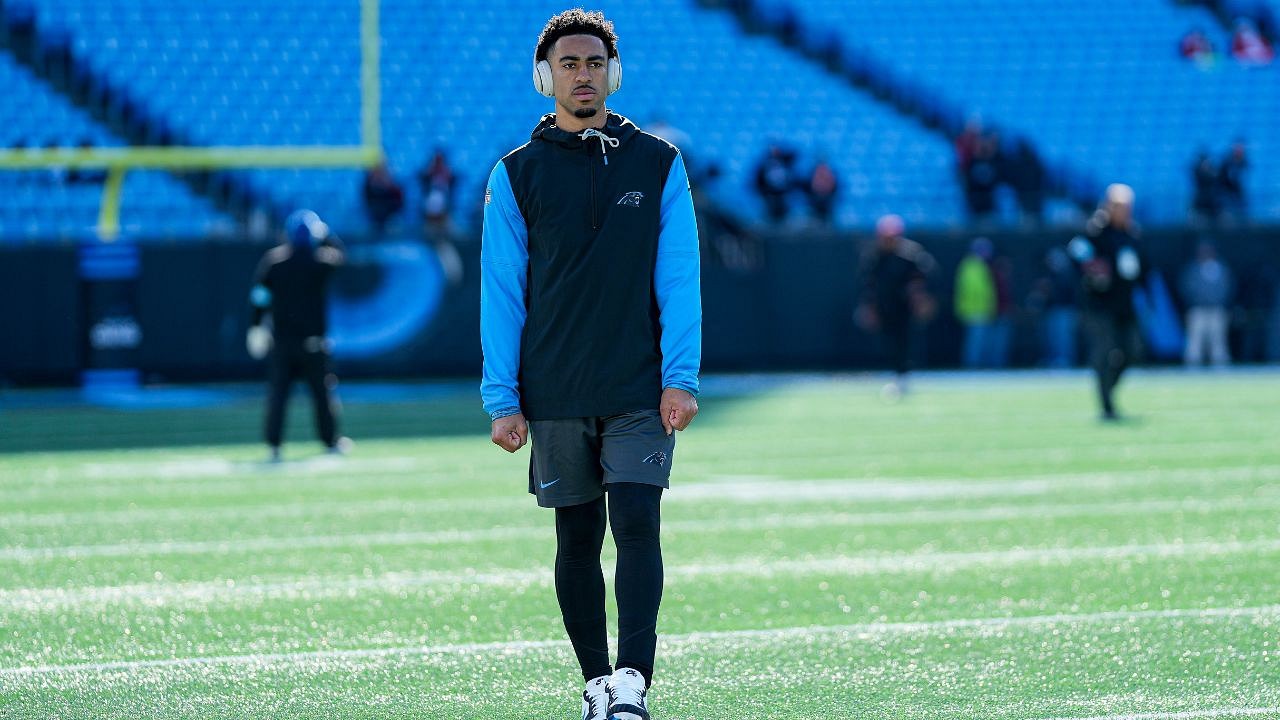
Bryce Young has been on a bumpy ride with the Carolina Panthers since being drafted, and it even took a toll on him last season. Unlike many others, the former number one overall pick has decided to speak openly about his mental health struggles. Prompting a conversation that not many fans, players, or coaches want to have around the league.
Advertisement
There’s always been a stigma about mental health struggles as an athlete. When Dak Prescott opened up about it in 2020, the response was somewhat deflected by the public. Negative attitudes and biases have seemingly discouraged some athletes of older generations from speaking out. Whether it be something external, like a family issue, or something internal, like their level of play.
It’s no secret that ever since being selected number one overall in the 2023 NFL Draft, Bryce Young has struggled to find his footing. In 28 career starts, he’s won just 6 games. And all of the losses have weighed heavily on him mentally. Young opened up about it while discussing the stigma surrounding the topic.
“There’s definitely been a big stigma around [discussing mental health in] athletics for a long time. For me, I like to deal and live in the truth. I’m super grateful to have my profession. I’m super passionate about it, but we’re all human,” he told GQ Sports.
“People, a lot of times, think that we don’t have the same struggles, we don’t deal with the same things. Our lives, at times, maybe can look different from others, but it’s all a set of circumstances. The makeup of who we are, what we go through from an emotional level, it’s all the same,” he added.
Young explained how he comes from a family that works as therapists and counselors. His father, Craig, is a mental health therapist and played an instrumental role in his upbringing. His mother, Julie, is a former special education teacher who offers Bryce her unwavering support.
Young’s father once explained how important mental health was in their family. “It’s just something that we’ve always paid a lot of attention to,” Craig told CBS Sports. “And we always wanted to provide an environment for Bryce where he felt safe and he felt loved and he felt encouraged irrespective of his outcomes.”
He added: “We provided a safe place for him to express his feelings or sometimes not to express his feelings… that whatever he’s feeling was okay and that we were there to help him problem solve and that through that problem-solving journey he was always loved and we were there for him.”
The style of upbringing seems to be paying off. Young is now on a mission to make mental health a more suitable topic to talk about in NFL culture. Even though most fans don’t want to mention it, the Carolina QB wants to let every kid know that it’s okay to ask for help.
Look, the studies and statistics don’t lie. Between 5% – 35% of elite athletes have some form of mental health disorder. And that’s just the elite ones. Almost everyone goes through the mental obstacle of coming to terms with the idea that they aren’t as good as the elite athletes. Which is an unquantifiable number.
Young’s generation is simply not as afraid to let people know when they aren’t doing okay mentally. And while the stigma has always dissuaded such athletes from speaking out about it, it’s great that Bryce is trying to change that notion. Behind the education from his parents, his status, and his great smile, he could indeed make a difference.
Health
McDonald named volleyball assistant coach
Story Links SLIPPERY ROCK, Pa. – Raquel McDonald will join the Slippery Rock University volleyball program as an assistant coach, head coach Dylan Lasher announced Wednesday. “We’re very excited to have Raquel join our program,” said Lasher. “She will bring a great deal of energy, work ethic and commitment to SRU. Raquel’s passion, successful playing career […]


SLIPPERY ROCK, Pa. – Raquel McDonald will join the Slippery Rock University volleyball program as an assistant coach, head coach Dylan Lasher announced Wednesday.
“We’re very excited to have Raquel join our program,” said Lasher. “She will bring a great deal of energy, work ethic and commitment to SRU. Raquel’s passion, successful playing career and coaching ability will be extremely beneficial to our players, staff and community.”
McDonald comes to The Rock after spending two successful seasons on Lasher’s staff at Thiel College.
“I’m looking forward to starting this new chapter at Slippery Rock University and am excited for the opportunity to grow, contribute, face challenges and work alongside a great team,” said McDonald. “Let’s get to work!”
During her time at Thiel, McDonald assisted in all facets of the volleyball program and helped Lasher turn around the Tomcats’ women’s team that after going just 3-22 in 2023 compiled an impressive 17-9 record in 2024.
The 2024 season not only marked the second-highest victory total inside the Thiel women’s program since 2012, The 14-win improvement from 2023 to 2024 was the second-best year-to-year improvement among all 419 NCAA Division III women’s volleyball programs last fall.
McDonald was also an assistant for the Thiel men’s program which concluded its 2025 season with a 22-7 record that included a perfect 12-0 showing in the Presidents’ Athletic Conference, a PAC Tournament championship and an NCAA Tournament berth.
Prior to embarking on her coaching career, McDonald was a standout middle blocker for Thiel from 2019-22. Over 95 career matches, McDonald totaled 208 blocks, 660 kills and a .247 attack percentage while being named an All-PAC honoree on three occasions in addition to earning a spot on the College Sports Communicators Academic All-America Team as a senior.
McDonald, who ranks second in Tomcat program history in career attack percentage and ninth in total blocks, graduated from Thiel with her bachelor’s in cognitive psychology, sociology and criminal justice while minoring in Spanish. She is currently finishing her master’s in special education from SRU.
Outside of volleyball, McDonald has served as a Behavioral Health Technician at George Junior Republic, taught Spanish at Kennedy Catholic High School and was the Director of Student Services at the William Penn Academy.
A native of Syracuse, New York, McDonald officially began her new role at SRU this week.
The Slippery Rock volleyball team opens its 2025 season 3 p.m. Sept. 3 against Elizabeth City State University at the Fairmont State Classic.
To stay up to date with all that happens at The Rock, follow our official Athletic Communication accounts on ‘X’ (formerly Twitter, @Rock_Athletics), Facebook (RockAthletics) and Instagram (RockAthletics).
Health
NCAA to consider allowing athletes, staff to bet on professional sports
The NCAA Division I Council will consider a proposal to allow athletes and staff to wager on professional sports, the organization announced Tuesday. Interestingly, the change would only go into effect if Division II and Division III also vote to lift their prohibitions on professional sports gambling, which will take place next month. All rules regarding […]


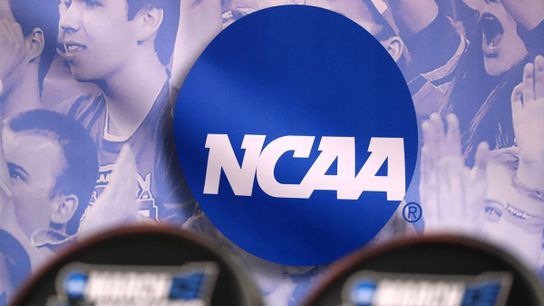
The NCAA Division I Council will consider a proposal to allow athletes and staff to wager on professional sports, the organization announced Tuesday. Interestingly, the change would only go into effect if Division II and Division III also vote to lift their prohibitions on professional sports gambling, which will take place next month. All rules regarding betting on college sports will remain in place.
The reasons for this possible rules change are several, all of them interesting:
— There’s a general fatigue around enforcing gambling rules considering how wide-spread sports betting has become in American culture ever since the Supreme Court overturned the federal ban on sports wagering in 2018. Thirty-nine states now allow sports betting, and it’s become a common pastime among young people (more on this below), and generally there’s a feeling that the NCAA and its members are wasting their time prosecuting college golfers for putting $100 worth of action on a Monday Night Football game.
“NCAA rules prohibiting sports betting at all levels were written and adopted at a time when sports gambling was largely illegal nationwide,” NCAA DI Council chairman and Illinois AD Josh Whitman said.
— There’s also a feeling that punishing sports betting may actually be making a serious problem worse. As Pat Forde wrote for Sports Illustrated earlier this week:
Toward that end, campus athletic mental-health practitioners have been given more information to treat problem gambling in a manner similar to other addictive behaviors. The hope is that gambling addicts would be more willing to admit a wagering problem and seek help if they weren’t afraid of losing eligibility for betting on pro sports.
“One of the big things that’s not really being tracked is gambling as a mental-health issue,” one source says. “We should be helping people instead of whacking them with ineligibility.”
“Throughout our discussions, the council has remained focused on student-athlete wellness and educating student-athletes about the risks and potentially harmful impacts of betting,” Whitman said.
In September, Fairleigh Dickinson University published a survey that found 10 percent of young men exhibited behavior consistent with a gambling addiction, more than three times the national average. “By meeting student-athletes where they are, schools may be more effective at preventing, identifying and supporting student-athletes with problematic gambling behaviors. Regardless of the change, schools are encouraged to use the many sports betting resources already available,” NCAA chief medical officer Dr. Deena Casiero said.
— Unspoken by the NCAA, but money is also undoubtedly a factor. Every athletics department in the country is looking for new revenue streams right now, and the gambling industry has become an attractive option for many. Last week, Iowa State announced that Cyclone Sports Properties and its We Will Collective have reached a sponsorship agreement with Elite Casino Resorts. This is the same Iowa State (along with Iowa) that found itself in a major gambling scandal just two years ago. (Five current or former Cyclones football staffers collectively wagered more than $100,000 across 6,200 bets, and routinely wagered on Iowa State men’s and women’s basketball games — which would still be a violation of NCAA rules.)
Allowing their staff and players to bet on professional sports might make athletics departments feel less gross about taking a casino’s money.
— Sparked by the Iowa/Iowa State scandal, the NCAA reviewed its gambling policies and found they were more restrictive than other major sports organizations of similar stature.
— However, Forde reports that it’s not a guarantee that the ban will be lifted. Opponents have made the slippery-slope argument against lifting the prohibition, reasoning that normalizing betting on pro sports will make it more likely that staffers and athletes will then bet on college sports.
To that end, the NCAA has made it a major priority to lobby against allowing sports books to create prop bets around college athletes. In March, the NCAA touted that 18 states have banned athlete prop bets while launching its Don’t Be a Loser campaign in conjunction with the opening of the Division I basketball tournament.
NCAA president Charlie Baker says allowing prop bets risks the safety of both the athletes themselves and the integrity of the competitions.
“Go sit behind the bench at one of these conference tournaments and listen to the bettors, yell and scream at these kids about their performance,” Baker said in March. “‘You need to do better. I’m losing money on you.’ Or the stuff that shows up online which we track in our tournaments, which is way more vicious and brutal than that. It’s really, this is a problem.”
So, one faction of the D1 Council is uncomfortable with of knocking down the wall between the NCAA and such a risky activity like gambling.
“It’s been hotly debated,” one source told Forde. “This is not a slam dunk.”
Health
Amber Glenn discusses mental health journey on TODAY
Two-time U.S. figure skating champion Amber Glenn reflected on her mental health journey, starting with briefly stepping away from the sport in late 2015, in a TODAY interview that aired Tuesday. “I was in a very dark place,” Glenn said, referring to 2015 and noting she was diagnosed with anxiety, depression and an eating disorder. […]


Two-time U.S. figure skating champion Amber Glenn reflected on her mental health journey, starting with briefly stepping away from the sport in late 2015, in a TODAY interview that aired Tuesday.
“I was in a very dark place,” Glenn said, referring to 2015 and noting she was diagnosed with anxiety, depression and an eating disorder. “One of my friends contacted one of my parents, and I sought help. I’m so grateful for that.”
Glenn turned 16 years old during that time. She reflected for months and did step back on the ice.
“I had no idea (if I would go back to figure skating),” Glenn told TODAY. “I knew that there was no way I could go back to the way I was doing things. And eventually I got to a place where I was doing things in a healthy way, and I could speak about my struggles.”
In March 2016, while still on a break from competition, Glenn attended the World Championships women’s free skate in Boston.
She watched as American Ashley Wagner performed brilliantly, moving up from fourth place after the short program to earn a silver medal.
It was part inspiring and also part discouraging. Glenn didn’t believe at the time that she could ever reach that level.
“Growing up, I saw the top skaters as untouchable and as these people who didn’t have the same struggles that I was having at that age,” she said. “Eventually, I got a peek behind the curtain, and they were struggling in silence. After seeing that, I realized that it was more important for me to be honest about my journey than to try and act like everything was perfect.”
Eight years after that time away, Glenn won her first senior U.S. title in 2024, then repeated as champion this past January.
She also won this past December’s Grand Prix Final, the second-most prestigious annual international event after the World Championships.
Glenn is bidding to make the three-woman team for the 2026 Milan Cortina Olympics, which will be decided by a committee after this upcoming January’s U.S. Championships.
At 26, she can become the oldest U.S. women’s singles skater to compete in an Olympics in 98 years.
“Part of me is still in disbelief,” Glenn told TODAY. “I need to trust that I put in the work to be here and that I do deserve it.”
Amber Glenn reflected on long-ago memories of Jason Brown and Ashley Wagner, plus recent ones with a local school class.
Health
Athletics take road win streak into game against the Tigers
Athletics (32-48, fifth in the AL West) vs. Detroit Tigers (49-30, first in the AL Central) Detroit; Tuesday, 6:40 p.m. EDT PITCHING PROBABLES: Athletics: Luis Severino (2-7, 4.42 ERA, 1.34 WHIP, 66 strikeouts); Tigers: Tarik Skubal (8-2, 2.06 ERA, 0.85 WHIP, 117 strikeouts) BETMGM SPORTSBOOK LINE: Tigers -299, Athletics +237; over/under is 7 runs BOTTOM […]



Athletics (32-48, fifth in the AL West) vs. Detroit Tigers (49-30, first in the AL Central)
Detroit; Tuesday, 6:40 p.m. EDT
PITCHING PROBABLES: Athletics: Luis Severino (2-7, 4.42 ERA, 1.34 WHIP, 66 strikeouts); Tigers: Tarik Skubal (8-2, 2.06 ERA, 0.85 WHIP, 117 strikeouts)
BETMGM SPORTSBOOK LINE: Tigers -299, Athletics +237; over/under is 7 runs
BOTTOM LINE: The Athletics will try to keep a three-game road win streak going when they face the Detroit Tigers.
Detroit has a 26-12 record at home and a 49-30 record overall. The Tigers have the fifth-best team ERA in baseball at 3.50.
The Athletics have a 32-48 record overall and a 17-21 record in road games. The Athletics have hit 98 total home runs to rank fourth in the AL.
The matchup Tuesday is the first meeting this season between the two clubs.
TOP PERFORMERS: Riley Greene leads the Tigers with 37 extra base hits (20 doubles and 17 home runs). Javier Baez is 14 for 35 with two doubles, a triple, three home runs and six RBIs over the past 10 games.
Brent Rooker leads the Athletics with 15 home runs while slugging .482. Luis Urias is 11 for 36 with two doubles, a home run and three RBIs over the last 10 games.
LAST 10 GAMES: Tigers: 5-5, .262 batting average, 5.16 ERA, outscored by three runs
Athletics: 6-4, .237 batting average, 3.96 ERA, outscored by seven runs
INJURIES: Tigers: Jackson Jobe: 60-Day IL (flexor), Jason Foley: 60-Day IL (shoulder), Alex Cobb: 60-Day IL (hip), Matt Vierling: 10-Day IL (shoulder), Reese Olson: 15-Day IL (finger), Ty Madden: 60-Day IL (shoulder), Jose Urquidy: 60-Day IL (elbow), Alex Lange: 60-Day IL (lat)
Athletics: Gunnar Hoglund: 60-Day IL (hip), Grant Holman: 15-Day IL (shoulder), Seth Brown: 10-Day IL (elbow), Shea Langeliers: 10-Day IL (oblique), Miguel Andujar: 10-Day IL (oblique), Zack Gelof: 60-Day IL (hand), Jose Leclerc: 60-Day IL (shoulder), Brady Basso: 60-Day IL (shoulder), Ken Waldichuk: 60-Day IL (elbow), Luis Medina: 60-Day IL (elbow)
The Associated Press created this story using technology provided by Data Skrive and data from Sportradar.
Health
Eating Disorders in Young Athletes
Playing sports has a ton of benefits during adolescence. It can boost self-esteem, provide socialization opportunities and improve physical fitness. But for some teens — especially those who play at an elite level — sports can be a source of pressure and lead to changes in eating patterns and behaviors that may become problematic. Lucy […]


Playing sports has a ton of benefits during adolescence. It can boost self-esteem, provide socialization opportunities and improve physical fitness. But for some teens — especially those who play at an elite level — sports can be a source of pressure and lead to changes in eating patterns and behaviors that may become problematic.

“Elite athletes often have a desire to be the best in their chosen sport — it’s what makes them great and drives them to excel. But that mentality can also affect how they view their body, weight and interaction with food,” says Lucy Lot, MD, an MU Health Care pediatrician and adolescent medicine physician. “Even if your teen doesn’t compete at an elite level, the culture around some sports is traditionally weight-focused.”
Some teen athletes are more likely than others to develop eating issues. According to research, eating disorders are more common among elite youth athletes compared to the general population. The athletes at highest risk include:
- Athletes who play sports that value leanness or require weigh-ins
- Athletes with a higher body mass index (BMI)
- Females
“It’s cause for concern any time a teenager develops maladaptive behaviors with food intake and weight control, such as taking diet or water pills, restricting food intake, binge eating or exercising beyond what’s required for chosen sport,” Dr. Lot says. “However, eating issues are not as easy to spot as some might think, especially at the outset.”
Here’s what you need to know:
How Eating Disorders Affect Teen Athletes
Teens who have eating disorders — regardless of whether they are athletes — will experience a lot of mental and physical effects. Their unhealthy eating patterns can result in inadequate nutrition and affect hormonal function.
Athletes who don’t fuel their bodies properly may develop relative energy deficiency in sports (RED-S), formerly called female athlete triad. This syndrome, which affects males and females, is marked by hormonal changes and impacts several body systems and functions.
Teen athletes affected by RED-S may experience symptoms that affect their health and athletic performance, including:
- Decreased muscle mass, causing slower recovery, coordination issues and decreased performance
- Mental health changes, including depression, anxiety and increased irritability
- Fatigue and dizziness, associated with poor nutrition
- Low testosterone in males
- Menstrual issues in women, including irregular periods or absence of menstruation
- Weakened bones, which increases the risk of a sports-related injury
“The health effects of eating issues, and how long those effects last, depend on the severity of the condition,” Dr. Lot says. “Eating disorders impact athletic performance in ways young athletes can’t imagine. For example, eating disorder can cause the heart to lose up to 25% of its muscle mass, leaving it unable to effectively pump much needed blood to support physical activity.”
Signs of Eating Disorders in Teens
Don’t assume that because your teen athlete is a healthy weight that they don’t have problem eating, says Dr. Lot. While your child may not have a specified eating disorder, they may have disordered eating — unhealthy eating patterns that can be a precursor to an eating disorder.
It can be challenging to notice signs of disordered eating when your teenager is independent and eating alone or out with friends. Changes in weight is one of the easiest sign to notice, but it’s not necessarily the earliest. Parents should also watch for:
- Eating in secret or refusing to join the family for meals
- Hyperfocus on weight that may include comments about weight, meticulously counting calories and tracking every bite eaten
- Menstrual changes in females
- Mood changes such as increased anger, irritability or sadness
- Poor endurance if endurance has not been a problem previously
- Sensitivity to cold, and suddenly having cold hands and feet
- Skipping meals, often followed by eating large portions or binging
“The good news is that with early recognition and intervention, your teen can go from disordered eating back to a healthy relationship with food and weight before it evolves into an eating disorder,” Dr. Lot says. “It is critical to recognize the signs early.”
How to Help Your Teen Athlete Eat Healthy
Modeling healthy eating behavior is the best way to promote healthy eating habits in children. However, athletes can have different nutritional needs depending on the intensity and duration of their daily physical activity.
To help your athlete meet those needs and ensure they are eating healthy, Dr. Lot recommends:
- Discuss nutrition: Make sure your teen understands the value of fueling their body with macronutrients, vitamins and minerals. Encourage them to take a nutrition class at school if possible.
- Engage your child’s pediatrician: Contact your pediatrician before your child’s appointment so they can discuss diet and nutrition with your teen.
- Consider speaking with a sports dietitian: Especially for high level athletes needing significant dietary adjustment during sport season. These nutrition experts can analyze your teen’s energy intake and expenditure. They can then use that information to coach you and your child and recommend a balanced and healthy eating plan.
- Focus conversations with your teen around health: If you have concerns about your child’s eating habits, try not to focus on their weight. Instead, ask how they are feeling, talk about any changes you’ve seen in their mood, attitudes, relationships or performance. Seek to understand what is going on and offer dietary and health advice.
- Have regular touchpoints and meals together: Intentionally connecting with your child daily, including during some mealtimes, makes it more likely that you’ll recognize an emerging concern before it becomes a problem.
“Remind your teen that just because someone is a social media influencer or working in a health store does not make them experts on nutrition,” Dr. Lot adds. “If your teen has questions on how to fuel their body, a health care professional is always the best source of information.”
What to Do If You Suspect Your Teen Athlete Has an Abnormal Relationship with Food
If you are worried about your child’s eating behavior, start with an open and honest discussion. Have the conversation during a relaxed time, when your teen is less likely to be defensive and not needing to rush off somewhere. Let your child know that your concerns are less about weight and more about their health, happiness and general well-being. And if you think it would be helpful, consider sharing any personal experience with disordered eating and the journey you had to a healthier relationship with food.
If the signs of disordered eating are persistent or getting worse, or you’re concerned about an eating disorder, Dr. Lot says your child’s primary care provider should be your first call.
“Don’t wait to engage a medical professional if you sense something is off with your child’s eating pattern or nutrition,” Dr. Lot says. “Children and teens who have healthy a relationship with food are more likely to continue the trend into adulthood.”
Next Steps and Useful Resources
Health
Aaliyah Jenkins named 2024
Story Links All-Time Ruth Russell Award winners RENO, Nev. – Aaliyah Jenkins’ added yet another jewel to the crown of her Nevada Softball career, being named Nevada Athletics’ 2024-25 recipient of the Ruth Russell Award. Jenkins is the third Wolf Pack softball student athlete to claim the honor in the last five years, following Sadaria McAlister […]
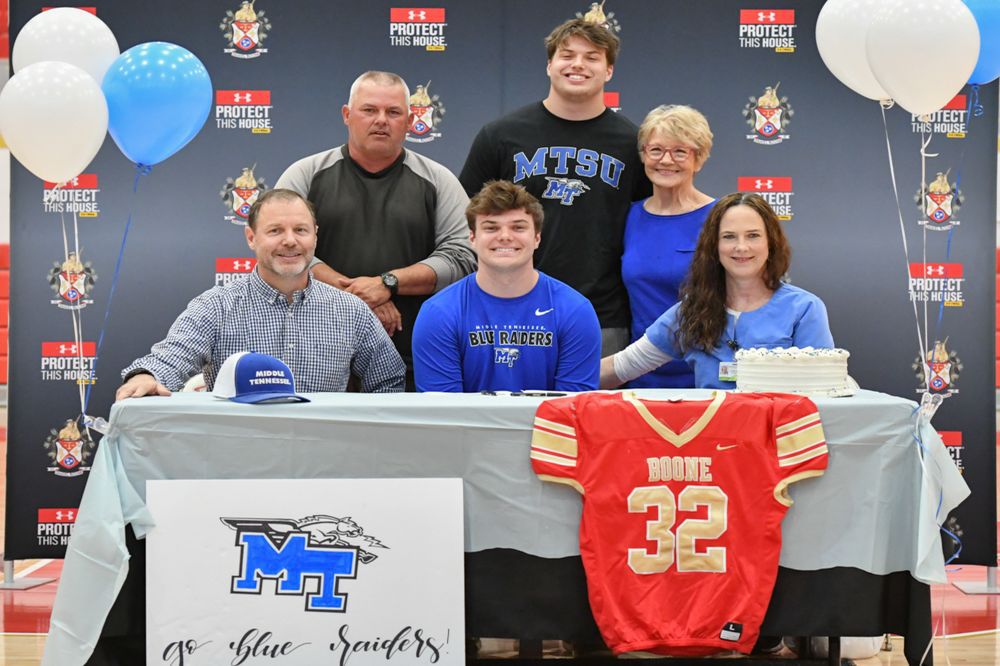


RENO, Nev. – Aaliyah Jenkins’ added yet another jewel to the crown of her Nevada Softball career, being named Nevada Athletics’ 2024-25 recipient of the Ruth Russell Award.
Jenkins is the third Wolf Pack softball student athlete to claim the honor in the last five years, following Sadaria McAlister (2021) and Chelie Senini (2024).
Established in 1996 and named for former Nevada Director of Women’s Athletics Ruth Russell (1948-69), the award is given out annually to Nevada’s top female student athlete in their final year of eligibility and in good academic standing.
Jenkins was named Nevada’s first All-American since 2008 when she earned second-team honors from D1Softball in May. Her four-year Wolf Pack career (2022-25) included four All-Mountain West honors, three to the First Team (2022, 2024-25), and being named Mountain West Freshman of the Year in 2022.
She capped her final season by being voted Mountain West Player of the Year and helping lead Nevada to its first Mountain West regular season championship in 2025.
Jenkins’ career numbers are among the best of any member of the program. She wrapped her career as the program’s all-time leader in home runs (54), RBIs (196), total bases (447), slugging percentage (.719), while also ranking in the Wolf Pack top 10 in runs (second, 171), walks (second, 95), stolen bases (second, 83), doubles (fourth, 52), triples (t-fourth, 9), on-base percentage (fifth, .442), hits (sixth, 215), batting (eighth, .346), games played (t-ninth, 212), and games started (10th, 209).
Jenkins put up arguably the best individual season in program history in 2025, as along with her All-America recognition and Mountain West honors she was named to the NFCA All-Mountain First Team. The Tracy, Calif., native ranked in the top 50 nationally in slugging percentage (11th, .916), batting average (13th, .446), total bases (14th, 152), on-base percentage (18th, .546), runs (20th, 64), doubles (21st, 17), stolen bases (22nd, 31), RBIs (44th, 60), and hits (45th, 74).
The Tracy, Calif. native won five Mountain West Player of the Week awards in 2025, the first player to do so in 20 years. In conference regular-season games, Jenkins led the Mountain West in batting average (.522), on-base percentage (.607), slugging percentage (1.159), runs (29), hits (36), RBI (32), triples (four), home runs (10), total bases (80), and stolen bases (16). Jenkins set a Mountain West senior record with her batting average, slugging percentage, on-base percentage, triples, and stolen bases.
-

 Motorsports2 weeks ago
Motorsports2 weeks agoNASCAR Weekend Preview: Autódromo Hermanos Rodríguez
-
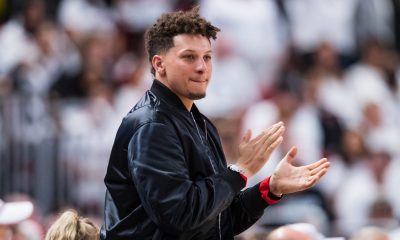
 NIL3 weeks ago
NIL3 weeks agoPatrick Mahomes in OKC for WCWS, praises NiJaree Canady and Texas Tech
-

 NIL3 weeks ago
NIL3 weeks agoGreg Sankey fires jab at obstruction rule after controversial WCWS call in Texas vs. Texas Tech
-

 NIL3 weeks ago
NIL3 weeks agoReport
-

 NIL3 weeks ago
NIL3 weeks agoTexas Tech Pitcher’s $1M Deal Proves What’s Possible For Women
-

 Motorsports2 weeks ago
Motorsports2 weeks agoNASCAR Through the Gears: Denny Hamlin has gas, a border needs crossing, and yes, that’s a Hemi
-

 Motorsports3 weeks ago
Motorsports3 weeks agoChase Elliott’s $12.6 billion backer made major Kyle Larson decision – Motorsport – Sports
-
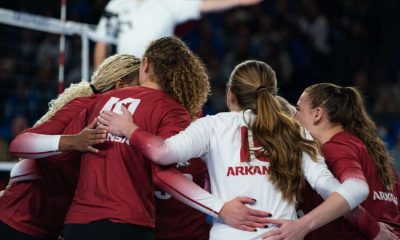
 Sports3 weeks ago
Sports3 weeks agoArkansas Volleyball reveals 2025 schedule dates
-

 Health3 weeks ago
Health3 weeks agoBold and unapologetic
-

 NIL3 weeks ago
NIL3 weeks agoMahomes lauds NiJaree Canady, Texas Tech softball at WCWS finals




































